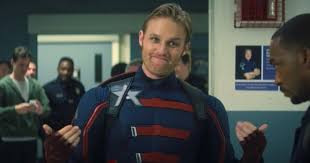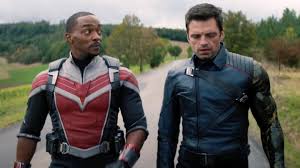The Falcon and the Winter Soldier does more than tell the story of a world without Steve Rogers. It asks and begins to answer the question, “What does it mean to have (or be) a black Captain America?” With the current events of our society, this story comes at a time when systemic racism is at the forefront of American politics ‒ as a black man, Sam Wilson’s transition to Captain America is complicated, and this is explored through the six-episode arc.
Six months after the events of Avengers: Endgame, Sam is left with a choice – pick up Cap’s mantle or leave the shield behind. He initially chooses the latter option, instead deciding he can better serve the country by continuing on as the Falcon. He decides to focus on a new threat, the Flag Smashers. Led by teenager Karli Morgenthau, this group believes the world was better during the “Blip” due to increased access to resources and housing. They are fighting for open national borders.
Meanwhile, Bucky is adjusting to life after finally ridding himself of the Winter Soldier during his time in Wakanda. However, he is grappling with severe PTSD from both his time as the Winter Soldier and the events of the final Avengers films. He reflects on this in therapy stating, “I didn’t have a moment to deal with anything, you know? I had a little calm in Wakanda. And other than that, I just went from one fight to another for ninety years.”
Forced to Take Action
Soon after Sam gives up the shield, the government announces a new Captain America: blond hair, blue-eyed, Caucasian John Walker. This prompts Bucky to attempt to convince Sam to change his mind and take up the shield. During their investigation, the duo quickly learns that the Flag Smashers are a major threat. Six of their members have taken super soldier serum, including Karli. Their journey takes them to old friends and enemies, reuniting them with both Sharon Carter in Madripoor and forcing them to work alongside Civil War “villain” Baron Zemo.

Photo Credit: Marvel Studios
Bucky also introduces Sam to Isaiah Bradley, a black veteran super soldier who he fought during the Korean War. Sam is horrified to learn of Bradley’s imprisonment and subsequent forced experimentation by the U.S. government and Hydra. Bradley’s story only further solidifies his resolve not to be Captain America.
As the new Captain America, Walker is navigating his role while dealing with untreated symptoms of PTSD. After his confidence is shaken by his lack of ability to fight enhanced soldiers, he gives into the temptation to take super soldier serum. The serum enhances both his positive and negative qualities. Soon after taking the serum, he loses his title as Captain America when he loses control and kills a member of the Flag Smashers in public.
The events come to a head as the Flag Smashers enact their plan to stop the Global Repatriation Council (GRC) from voting on a motion that would force people to relocate back to their countries of origin. Walker decides to show the world he is still Captain America by creating his own version of the shield and jumping into battle. However, another Captain America has already joined the battle. Having recovered the shield, Sam dons a new uniform courtesy of the Wakandans and completes his transition to Captain America.

Photo Credit: Marvel Studios
Sam Finally Takes the Shield
When the fight ends, the GRC states their intention to continue forward with their vote despite the violent, desperate means taken by the Flag Smashers. Instead of backing down, Sam takes this opportunity to speak out. He speaks to both the members of the GRC and the world via the news cameras gathered around him. “Every time I pick this thing up, I know there are millions of people out there who are going to hate me for it,” he says. “Yet I’m still here. No super serum. No blond hair or blue eyes. The only power I have is to believe we can do better.”
The series brings injustice and inequality to the forefront. The Flag Smashers, while flawed in their execution, had an important message. They wanted to find a way for all people to live with enough food, water, and shelter. At their core, they had a moral goal; however, they used immoral means to achieve their ends. Sam recognizes the validity of their struggle and movement. He is able to build a bridge of understanding by using his position to open up a dialogue. There is work to be done, and Sam is ready to take up his part in the fight.
Therapy With a Cinematic Approach in Florida, Idaho, South Carolina, and Utah
Movies have a way of capturing emotions, experiences, and struggles that can be hard to put into words. At Calming Transformations Counseling, our therapists understand how these challenges can affect your emotional and mental well-being. We use cinema therapy to help clients connect with stories that mirror their journeys, offering fresh perspectives and deeper self-understanding. By exploring characters, themes, and emotions on screen, we create a space for reflection, healing, and personal growth—because sometimes, the right film can say what you’ve been feeling all along.
Interested in learning more? Contact us here.
Photo Credit: Marvel Studios
